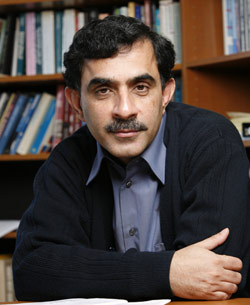Penn's Center for the Advanced Study of India (CASI) is funding and designing the largest non-government study of economic gains made by India's Dalit caste. Dalits comprise about one-sixth of the country's population and historically have been at the bottom of the complex social hierarchy that constitutes the caste system. The research will help address one of the major challenges facing contemporary India: how to extend the benefits of its economic growth and development to marginalized social groups.
"Chandra Bhan Prasad has been at the forefront of challenging conventional wisdom about the economic empowerment of Dalits, which has centered on state-led initiatives." – Devesh Kapur
A major component of the study is a qualitative survey, conducted in spring 2008, of 20,000 households in the Indian state of Uttar Pradesh. It was led by Chandra Bhan Prasad, a leading Dalit thinker and political commentator in India. Prasad began his partnership with the Center when he was invited to spend a year at Penn as part of the CASI Visiting Scholar/Fellows Program.
"Chandra Bhan Prasad has been at the forefront of challenging conventional wisdom about the economic empowerment of Dalits, which has centered on state-led initiatives," says Devesh Kapur, director of CASI and Madan Lal Sobti Associate Professor for the Study of Contemporary India. "He believes modern technologies, capitalism and markets do more than the state to weaken the link between caste and occupation—a key mechanism by which caste is perpetuated."
The survey tests this theory by comparing a host of variables about the lives of Dalits in 1990—the year before India launched major efforts to liberalize its economy—and in 2008. CASI worked with Prasad and other Dalit scholars to design questions, and Prasad enlisted members of the Dalit community to administer the survey on the ground.
CASI researchers are currently analyzing the enormous volume of resulting data, but preliminary results show that Dalits reported significant positive changes in their lives. However, Kapur cautions, "We cannot yet attribute this improvement primarily to economic reforms because there have also been other simultaneous changes, such as major political empowerment of Dalits." He explains that while there is still a long way to go in countering the longtime marginalization of this community, "From the survey, we can say confidently that the trend is positive."



